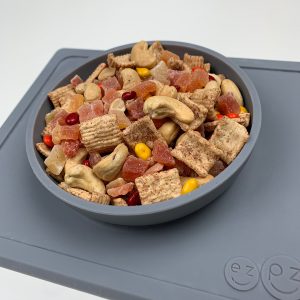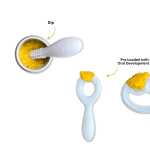Introducing Peanuts to Baby

Are you confused about when or how to offer peanuts to your baby? In this blog, I’ll teach you how to prepare it safely and why it’s so important to do so early and often.
Why Introduce Peanut Protein?
When I started as a feeding therapist in the 1990s, research showed that parents and therapists should wait to offer peanuts (in any texture form) until after the baby’s first birthday. Later, I was taught to introduce peanuts to a baby before their first birthday, but we would have to wait 3-5 days before offering the baby another food.
However, current research shows that delaying the introduction of peanut protein can increase risk. In fact, peanut allergy is now one of the most common pediatric food allergies. So, in these last few years, I’ve implemented the new guidelines of feeding babies peanut protein: early and often. Research shows that providing peanut protein early & often is vital in preventing peanut allergy. It should be noted that the research was done with food, not with powder supplements. So, as long as your baby is 6 months of age (and showing all the signs of readiness to eat), you can offer your baby peanut protein in delicious food form while skipping artificial peanut powders.
What are the Risk Factors for Peanut Allergy?
The three risk factors for your baby having a peanut allergy are 1) if they have eczema, 2) if they have an egg allergy, or 3) if they have both eczema and an egg allergy. If your baby has had eczema once before, that does not place your baby at high risk for a peanut allergy. The research shows that eczema must be severe (not just a mild case) to be a significant risk factor. And if your baby has an egg allergy, there is a potentially higher possibility for a peanut allergy.
It’s important to know that if your baby is going to have an allergic reaction to peanut protein, it will occur within a few minutes (or a few hours) after they eat it. This timeline will help you rule-out potential complications. To make you feel more comfortable about serving potentially allergenic foods, have another family member with you while you offer the food and talk to your pediatrician about possible medications in case a reaction occurs.
When to Introduce Peanut Protein?
The National Institutes for Health (NIH) recommends early introduction to peanut protein between 4-6 months for babies that are at high risk for peanut allergy. The National Institute of Allergy and Infectious Diseases also recommends peanuts to be introduced before 12 months of age. While the American Academy of Pediatrics (AAP) and the World Health Organization (WHO) both state that babies should only have breastmilk or formula until they are 6 months of age. This body of research and medical recommendations indicates that we can safely begin to offer peanut protein (in food form) to babies at 6 months of age.
I encourage parents to start serving peanut protein by eating it as food at 6 months and not in powder form at the 4-month mark. I have worked with many families that used peanut protein powders in their baby’s bottles between 4-6 months, only to have their baby refuse to eat from a bottle again (whether peanut protein powder was inside the bottle or not). Unfortunately, these babies required medical intervention, including weekly feeding therapy and having a feeding tube placed.
How to Safely Introduce Peanut Protein?
Offering whole nuts, chopped nuts, or a spoonful of peanut butter are all high choking risks for a baby. Here are a few ways to safely offer peanuts to your baby.
Puffs
I love to introduce babies to a peanut puff called, Puffworks which is an organic peanut butter product made specifically for babies. It is plant-based, gluten-free, vegan, and dissolves easily in your baby’s mouth. In addition, the size, weight, and texture of the puffs are much safer for your baby to chew & swallow (even without teeth) than other puffs on the market.
Puree
You can thin out smooth (not chunky) peanut butter by blending it with yogurt to make a puree. You can offer this mixture by preloading the ezpz Tiny Spoon and handing it to your baby. This is also a perfect opportunity for baby to practice their spoon-feeding milestones!
Smoothie
A smoothie is another way to offer peanuts to your baby. In a blender, mix breastmilk (or formula), smooth peanut butter, and some full-fat yogurt. Place the smoothie in the ezpz Tiny Cup and offer small sips to your little one!
Peanut is a food I always offer in the first month of baby-led weaning and continue to offer each month. Now that you know how to safely prepare it, I hope it will be one of your baby’s favorite tastes! #MsDawnSLP

P.S Get your baby some peanut puffs at: go.msdawnslp.com/Puffworks and use the code: MsDawn for 15% off! Use the code: BABY10 for 10% off ezpz products at: ezpzfun.com.





